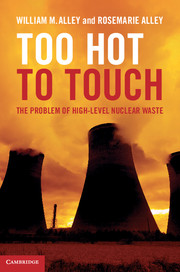Book contents
- Frontmatter
- Contents
- Acknowledgments
- List of units
- List of abbreviations
- Introduction
- Part I The problem
- Part II The mountain
- 12 The search for a geologic repository
- 13 Nevada wins the lottery
- 14 The Nevada Test Site
- 15 Yucca Mountain
- 16 How long is long?
- 17 Leaving almost no stone unturned
- 18 Surprise
- 19 Shake & bake
- 20 The project gets into hot water
- Part III No solution in sight
- Appendix Discussion questions
- References
- Index
18 - Surprise
from Part II - The mountain
Published online by Cambridge University Press: 05 February 2013
- Frontmatter
- Contents
- Acknowledgments
- List of units
- List of abbreviations
- Introduction
- Part I The problem
- Part II The mountain
- 12 The search for a geologic repository
- 13 Nevada wins the lottery
- 14 The Nevada Test Site
- 15 Yucca Mountain
- 16 How long is long?
- 17 Leaving almost no stone unturned
- 18 Surprise
- 19 Shake & bake
- 20 The project gets into hot water
- Part III No solution in sight
- Appendix Discussion questions
- References
- Index
Summary
There are known knowns. These are things we know that we know. There are known unknowns. That is to say, there are things we know we don't know. But, there are also unknown unknowns. These are things we don't know we don't know.
Donald RumsfeldThomas Chrowder Chamberlin (1843–1928) had a remarkable career. He is noted for his contributions to glaciology and for his early hypothesis that the ice ages might follow a natural cycle driven by feedbacks involving CO2. Chamberlin also served as president of the University of Wisconsin, president of the American Association for the Advancement of Science (the Nation's leading professional science organization), and founded the Journal of Geology. One of his most lasting contributions, however, is his insightful discussion of the method of multiple working hypotheses.
Using the flowery language of the time, T. C. Chamberlin described the dangers of “parental affection” for a favorite explanation or theory. He warned, “The moment one has offered an original explanation for a phenomenon which seems satisfactory, that moment affection for his intellectual child springs into existence.” Accordingly, this “intellectual affection” should be replaced with “intellectual rectitude,” by considering every rational explanation for new phenomena. In this manner, the investigator becomes “the parent of a family of hypotheses: and, by his parental relation to all, he is forbidden to fasten his affections unduly upon any one.”
- Type
- Chapter
- Information
- Too Hot to TouchThe Problem of High-Level Nuclear Waste, pp. 272 - 286Publisher: Cambridge University PressPrint publication year: 2012



